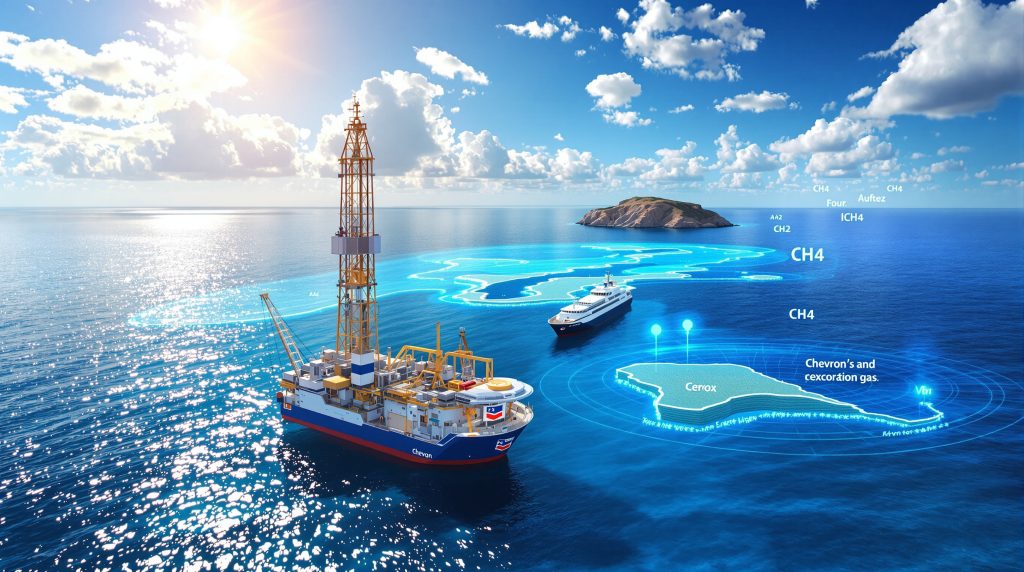Greece's extensive offshore territory spans approximately 400,000 square kilometers across the Eastern Mediterranean, creating one of Europe's most promising unexplored hydrocarbon frontiers. The recent Greece offshore exploration Chevron partnership represents a strategic investment in this frontier region, where the country's maritime boundaries position it within the same geological province as major gas discoveries that have reshaped regional energy dynamics over the past decade.
The geological formations beneath Greek waters share remarkable similarities with proven hydrocarbon systems found offshore Egypt and Israel. These neighboring regions have yielded extraordinary discoveries, including Egypt's Zohr field with 30 trillion cubic feet (TCF) of natural gas reserves and Israel's Leviathan field containing 22 TCF. Such discoveries demonstrate the Eastern Mediterranean's potential as a world-class gas province.
Greece's position offers unique advantages for energy exploration companies seeking access to European markets. The country's existing pipeline infrastructure and established energy trading relationships provide direct pathways to continental European consumers, while its EU membership ensures regulatory stability that international operators value for long-term investments. Furthermore, the US natural gas forecast suggests continued market opportunities for new production sources.
Recent geological assessments indicate that Greek offshore basins contain sedimentary structures favorable for hydrocarbon accumulation. Deep-water areas ranging from 1,000 to 4,500 meters depth mirror the geological conditions where neighboring countries have achieved commercial success in natural gas production.
Chevron's Strategic Entry into Greek Waters
The American energy giant's decision to lead the Greece offshore exploration Chevron initiative represents a calculated investment in one of the Mediterranean's remaining frontier regions. Chevron's selection of Greece reflects confidence in both the geological potential and regulatory framework that governs offshore development in EU waters.
Following the Greek government's exploration tender launched in April 2025, the Chevron Greece Holdings and Helleniq Upstream consortium emerged as the sole bidder for four offshore blocks. This positioning allowed the partnership to secure exploration rights across strategically located territories without competitive bidding pressure.
The timing of Chevron's Greek investment aligns with broader European energy security initiatives following supply disruptions that began in 2022. European nations have actively sought alternative energy sources, creating favorable market conditions for new natural gas discoveries that could enhance supply diversification. Moreover, understanding oil price trade dynamics remains crucial for energy companies evaluating Mediterranean opportunities.
Regional Energy Hub Development
Chevron's Greek operations could serve as a foundation for broader Eastern Mediterranean energy infrastructure development. The company's existing involvement in Israel's Leviathan field, which produces approximately 1.2 billion cubic feet per day, demonstrates its commitment to the regional gas market.
The partnership structure between Chevron and Helleniq Upstream combines international deepwater drilling expertise with local regulatory knowledge. This collaboration model has proven successful in other emerging offshore provinces where foreign operators partner with national energy companies.
Four Strategic Exploration Blocks Awarded
Greece's Ministry of Energy awarded exploration rights to four distinct offshore areas, each offering unique geological characteristics and hydrocarbon potential. These blocks represent the first major offshore licensing round to attract international operator interest since Greece enhanced its energy exploration framework.
South of Peloponnese Block
This exploration area covers deep-water territories southwest of Greece's largest peninsula, where water depths range from 1,000 to 3,000 meters. The block's position provides access to geological formations that extend from proven gas-bearing structures in adjacent regions.
Initial seismic data suggests the presence of multiple exploration targets within sedimentary basins that have undergone favorable geological processes for hydrocarbon generation and migration. The area's proximity to existing infrastructure could facilitate future development if commercial discoveries are confirmed.
A2 Block Specifications
The centrally positioned A2 block offers exploration opportunities in water depths ranging from 800 to 2,500 meters. This area provides access to previously unexplored geological formations that represent natural extensions of productive systems identified in neighbouring countries.
Technical assessments indicate the block contains multiple seismic anomalies consistent with potential natural gas accumulations. The relatively moderate water depths could reduce drilling costs compared to ultra-deepwater exploration targets.
South of Crete Exploration Areas
Two complementary blocks south of Greece's largest island target some of the deepest waters in the Eastern Mediterranean. South of Crete I encompasses areas with water depths from 2,000 to 4,000 meters, while South of Crete II extends into ultra-deepwater territories reaching 4,500 meters depth.
These deep-water blocks offer access to geological structures that may contain the largest potential hydrocarbon accumulations within Greek waters. The significant water depths require advanced drilling technologies that match Chevron's technical capabilities in similar environments globally.
Block Summary Comparison:
| Block Name | Water Depth Range | Primary Target | Geological Features |
|---|---|---|---|
| South of Peloponnese | 1,000-3,000m | Gas/Oil | Multiple basin structures |
| A2 | 800-2,500m | Natural gas | Moderate depth targets |
| South of Crete I | 2,000-4,000m | Gas reserves | Deep basin systems |
| South of Crete II | 2,500-4,500m | Major gas fields | Ultra-deepwater structures |
Comprehensive Exploration Timeline Framework
Greece's offshore exploration programme follows a structured three-phase approach designed to manage geological risk while maximising discovery potential. This timeline framework balances thorough geological assessment with efficient capital deployment across multiple exploration stages.
Phase One: Advanced Seismic Survey Operations (2026-2029)
The initial exploration phase centres on comprehensive seismic data acquisition using state-of-the-art marine survey technologies. These operations will create detailed subsurface images capable of identifying potential hydrocarbon-bearing geological structures across all four exploration blocks.
Planned seismic surveys include:
- 2D seismic lines covering 5,000 linear kilometres across regional geological trends
- 3D seismic mapping across 2,000 square kilometres of priority exploration areas
- Advanced imaging technology capable of penetrating 8+ kilometres depth into subsurface formations
- Environmental monitoring protocols ensuring compliance with EU marine protection directives
The three-year seismic phase allows sufficient time for data acquisition, processing, and geological interpretation before advancing to higher-risk drilling operations. This approach follows international best practices for frontier exploration in deepwater environments.
Phase Two: Exploratory Drilling Campaign (2030-2032)
Following successful seismic target identification, the consortium will commence exploratory drilling operations targeting the most promising geological structures identified during Phase One. Greek Energy Minister Stavros Papastavrou confirmed that test drilling would occur no sooner than 2030, providing adequate preparation time for drilling operations.
The drilling phase represents the highest-risk, highest-cost component of exploration operations. Wells in water depths exceeding 3,000 meters can cost $100-200 million each, requiring careful target selection based on comprehensive seismic analysis and geological modelling.
Operators will have up to five years to locate potential reserves during the exploration period, allowing flexibility for multiple drilling campaigns if initial wells encounter geological complexity or require additional data gathering.
Phase Three: Commercial Assessment (2033-2035)
Confirmed hydrocarbon discoveries undergo detailed reservoir engineering and commercial evaluation during the final exploration phase. This period determines whether discoveries contain sufficient reserves to justify development investment and infrastructure construction.
Commercial assessment includes:
- Reservoir size and productivity testing through extended well testing programmes
- Gas quality analysis determining processing requirements and market suitability
- Development scenario planning for optimal field development strategies
- Economic modelling incorporating current and projected energy market conditions
Helleniq Upstream's Strategic Partnership Role
Greece's largest energy company brings essential local expertise and regulatory knowledge to the offshore exploration partnership. Helleniq Energy (formerly Hellenic Petroleum) established its upstream subsidiary specifically to participate in domestic hydrocarbon exploration and production activities.
Local Regulatory Navigation
Helleniq Upstream's deep understanding of Greek environmental regulations, permitting processes, and stakeholder management provides crucial operational support for complex offshore projects. The company's established relationships with government agencies, environmental organisations, and local communities facilitate project implementation.
Greek offshore development requires navigation of multiple regulatory frameworks, including EU environmental directives, national energy policies, and regional maritime regulations. Local partnership ensures compliance with all applicable requirements while maintaining operational efficiency. Additionally, addressing energy exports challenges provides valuable insights for operators navigating complex international energy markets.
Technical Infrastructure Integration
The partnership leverages Helleniq's existing energy infrastructure, including pipeline connections, processing facilities, and market access agreements. This integration could reduce development costs and timeline for potential discoveries by utilising established infrastructure rather than building entirely new systems.
Partnership benefits include:
- Regulatory compliance expertise ensuring adherence to complex EU environmental standards
- Local stakeholder relationships facilitating community engagement and government liaison
- Infrastructure access providing potential development cost advantages
- Market knowledge supporting long-term gas sales and pricing negotiations
Eastern Mediterranean Discovery Context
Greece's exploration efforts occur within a regional context of extraordinary natural gas discoveries that have fundamentally altered Eastern Mediterranean energy dynamics. The broader regional success provides geological confidence for Greek exploration while demonstrating the commercial viability of Eastern Mediterranean gas development.
Major Regional Gas Field Performance
Established Eastern Mediterranean Gas Production:
| Field Name | Country | Reserves (TCF) | Annual Production | Development Timeline |
|---|---|---|---|---|
| Zohr | Egypt | 30.0 | 2.7 BCF/day | Discovered 2015, producing 2017 |
| Leviathan | Israel | 22.0 | 1.2 BCF/day | Discovered 2010, producing 2019 |
| Tamar | Israel | 11.0 | 1.0 BCF/day | Discovered 2009, producing 2013 |
| Aphrodite | Cyprus | 4.5 | Planned 2027 | Discovered 2011, development phase |
These discoveries demonstrate that Eastern Mediterranean geological conditions can support world-class natural gas accumulations. The combined proven reserves exceed 67 trillion cubic feet, representing one of the most significant new gas provinces discovered in the past two decades.
European Energy Security Integration
Regional gas discoveries have provided alternative supply sources for European energy security, particularly following Russian pipeline disruptions beginning in 2022. Eastern Mediterranean production currently supplies both regional markets and European consumers through established pipeline infrastructure and LNG facilities.
Successful Greek discoveries could enhance this regional energy network by providing additional supply diversity and reducing European dependence on volatile supply sources. The European Union's REPowerEU plan specifically identifies Mediterranean gas resources as strategic alternatives for enhancing energy independence, as reported by Reuters.
Geological Success Factors
The Eastern Mediterranean's exploration success reflects favourable geological conditions including:
- Thick sedimentary sequences providing adequate source rock and reservoir quality
- Structural complexity creating natural hydrocarbon traps and accumulation mechanisms
- Optimal burial depth ensuring hydrocarbon generation without excessive thermal alteration
- Migration pathways allowing hydrocarbon movement from source rocks to reservoir formations
Greece's offshore blocks share these favourable geological characteristics, supporting technical confidence in exploration potential despite frontier status.
Economic Transformation Potential for Greece
Offshore energy development represents a transformative economic opportunity for Greece, potentially generating substantial government revenues while enhancing national energy security. The scale of potential economic benefits depends on exploration success and the size of any commercial discoveries.
Direct Investment and Employment Impact
Conservative estimates suggest the exploration and development phases could generate €2-4 billion in direct investment over the next decade. This investment would flow through multiple economic sectors, including specialised services, marine transportation, and advanced manufacturing.
Employment generation potential includes:
- 5,000-15,000 direct and indirect jobs during peak development phases
- High-skilled technical positions in engineering, geology, and marine operations
- Local service industry expansion supporting offshore operations and personnel
- Technology transfer opportunities building domestic expertise in advanced energy sectors
The employment impact extends beyond direct energy sector jobs to include marine services, helicopter operations, catering services, and onshore support facilities that serve offshore operations.
Government Revenue Mechanisms
Successful discoveries would generate multiple revenue streams for the Greek government through established fiscal frameworks governing offshore development:
- Exploration and production licensing fees paid during initial concession awards
- Annual area fees based on block size and exploration phase
- Production royalties typically ranging 5-10% of production revenue
- Corporate income taxes on operator profits from commercial production
- Potential state participation through equity interests in development projects
Energy Independence Enhancement
Domestic offshore gas production could significantly reduce Greece's energy import dependency, which historically exceeded 75-80% of total energy consumption. Successful discoveries might reduce energy imports by 30-50%, providing greater price stability and supply security.
Current natural gas prices in European markets remain volatile, with Henry Hub prices at approximately $3.27 per million British thermal units (MMBtu) as of October 2025. Domestic production would provide price stability and reduce exposure to international market fluctuations.
Potential economic benefits include:
- Reduced trade deficit through decreased energy import requirements
- Foreign currency savings from reduced international energy purchases
- Industrial competitiveness through access to domestic energy supplies
- Regional energy hub potential if discoveries support export infrastructure development
Comprehensive Environmental Protection Framework
Modern offshore exploration in European Union waters incorporates extensive environmental safeguards that exceed international minimum standards. Greek offshore operations must comply with multiple overlapping environmental frameworks designed to protect marine ecosystems and biodiversity.
EU Environmental Regulatory Compliance
All exploration and development activities fall under comprehensive EU environmental legislation:
- Marine Strategy Framework Directive (2008/56/EC) requiring good environmental status maintenance
- Environmental Impact Assessment Directive (2014/52/EU) mandating comprehensive project impact evaluation
- Habitats Directive (92/43/EEC) protecting marine species and ecosystems
- Water Framework Directive (2000/60/EC) ensuring marine water quality protection
These directives require detailed baseline environmental studies, continuous monitoring during operations, and comprehensive mitigation measures to minimise ecosystem impacts.
Marine Ecosystem Protection Measures
Greece has designated 193 marine protected areas covering approximately 15,000 square kilometres across the Aegean and Ionian seas. Offshore operations must demonstrate compatibility with marine conservation objectives and implement advanced protection protocols.
Required environmental protection measures include:
- Marine habitat baseline surveys conducted before any exploration activities
- Continuous ecosystem monitoring during seismic surveys and drilling operations
- Marine mammal detection and avoidance protocols using acoustic monitoring systems
- Seasonal restrictions protecting fish spawning and marine mammal migration periods
- Oil spill prevention systems including subsea containment structures and response vessels
Advanced Spill Prevention Technology
Modern deepwater drilling incorporates multiple redundant safety systems that significantly exceed historical industry standards:
- Blowout preventers with backup activation systems and remote operation capabilities
- Real-time well monitoring using downhole sensors and surface data analysis
- Acoustic control systems enabling emergency well closure from surface vessels
- Casing design standards providing multiple barriers against formation fluid migration
- Emergency response vessels stationed near drilling operations with spill containment equipment
Climate Transition Alignment
Natural gas discoveries support European energy transition strategies by providing cleaner-burning alternatives to coal and oil. Natural gas produces approximately 50% fewer CO₂ emissions than coal when used for electricity generation, making it a valuable transition fuel during renewable energy infrastructure development. The broader context of renewable energy integration demonstrates how natural gas can complement sustainable energy development.
The European Union's energy policy recognises natural gas as supporting renewable energy integration by providing flexible backup capacity when wind and solar generation fluctuates. This alignment ensures that Greek gas discoveries would complement rather than compete with European climate objectives.
Democratic Parliamentary Approval Process
Greece's democratic oversight framework ensures comprehensive review of major energy concession agreements before implementation. The multi-stage approval process provides transparency and public accountability while maintaining investor certainty for international operators.
Constitutional Review Requirements
Under Greek constitutional framework, major energy concession agreements require full parliamentary ratification before becoming legally effective. The Greek Parliament's 300 members must vote on finalised concession terms, ensuring democratic legitimacy for major resource development decisions.
The parliamentary review process includes:
- Committee examination in relevant energy and economic affairs committees
- Public debate sessions allowing parliamentary questioning of government officials
- Floor vote requiring simple majority approval for concession ratification
- Public record maintenance ensuring transparent documentation of legislative proceedings
Independent Financial Oversight
The Greek Court of Audit conducts parallel independent review of concession agreements to ensure protection of national interests and fair commercial terms. This constitutional body, established under Article 98 of the Greek Constitution, provides financial and legal analysis independent of political considerations.
Court of Audit assessment includes:
- Financial terms evaluation ensuring fair government revenue sharing
- Legal compliance verification confirming adherence to national and EU law
- National interest protection assessment of strategic benefit for Greece
- Public procurement compliance verification of proper tendering procedures
Timeline for Democratic Approval
Greek Energy Minister Stavros Papastavrou indicated that concession finalisation is expected by the end of 2025, with parliamentary ratification required before seismic surveys can commence. This timeline allows sufficient review period while maintaining project momentum for international operators.
The approval process timeline includes:
- Government concession finalisation (Q4 2025)
- Parliamentary committee review (Q1 2026)
- Court of Audit assessment (parallel to parliamentary review)
- Parliamentary floor vote (Q1-Q2 2026)
- Seismic survey authorisation (Q2 2026)
Development Scenarios for Major Discoveries
Successful exploration could trigger rapid advancement to commercial development, potentially transforming Greece's position in regional energy markets. The development timeline and infrastructure requirements depend heavily on discovery size and reservoir characteristics.
Commercial Development Timeline
Regional development precedents provide insight into potential Greek timelines:
- Zohr Field (Egypt): Discovered 2015, achieved production 2017 (accelerated 2-year development)
- Leviathan Field (Israel): Discovered 2010, commenced production 2019 (9-year development cycle)
- Tamar Field (Israel): Discovered 2009, started production 2013 (4-year development)
Greek discoveries could achieve production within 3-7 years following commercial confirmation, depending on field size, water depth, and infrastructure requirements.
Subsea Infrastructure Development
Commercial discoveries would require sophisticated subsea production systems connecting wellheads to onshore processing facilities:
- Subsea wellhead systems designed for water depths up to 4,500 meters
- Pipeline networks transporting gas from offshore fields to shore
- Onshore processing facilities for gas treatment and compression
- Export pipeline connections linking to European gas transmission networks
The infrastructure investment for major discoveries could reach €3-8 billion, depending on field development complexity and processing requirements.
Regional Energy Hub Potential
Large discoveries could position Greece as a significant Eastern Mediterranean energy hub, potentially hosting regional gas trading facilities and export infrastructure serving multiple markets:
- LNG export terminals providing global market access for regional gas production
- Pipeline interconnections with Italy, Bulgaria, and other Balkan energy markets
- Gas storage facilities supporting European energy security and supply balancing
- Trading and distribution centres serving broader Southeast European energy needs
Market Integration Pathways
Greek gas production would integrate with existing European energy infrastructure through multiple pathways:
| Connection Route | Capacity | Target Markets | Infrastructure Status |
|---|---|---|---|
| Italy interconnection | 10 BCM/year | Southern Europe | Operational |
| Bulgaria pipeline | 3 BCM/year | Balkans/Central Europe | Operational |
| LNG facilities | Variable | Global markets | Potential development |
| Regional storage | 1-2 BCM | Southeast Europe | Expansion possible |
Investment Risk Assessment and Mitigation
Offshore exploration involves substantial financial commitments with inherent geological and technical uncertainties. Understanding and managing these risks requires comprehensive assessment of multiple factors affecting project success and economic viability.
Primary Geological Risk Factors
Exploration uncertainty represents the most significant risk category:
- Hydrocarbon presence uncertainty: No guarantee that oil or gas exists in commercial quantities
- Reservoir quality variables: Rock porosity and permeability may limit production rates
- Structural complexity: Geological faulting could complicate drilling and development
- Depth and pressure challenges: Ultra-deepwater conditions increase technical complexity
Eastern Mediterranean exploration success rates provide some guidance, though each prospect carries individual geological risks that require specific assessment and mitigation strategies.
Technical and Operational Challenges
Deepwater drilling operations face multiple technical risks:
- Weather conditions: Mediterranean storms can interrupt drilling operations
- Equipment reliability: Subsea systems require proven performance in deepwater environments
- Logistical complexity: Remote offshore locations increase support costs and scheduling challenges
- Environmental compliance: Strict EU regulations require advanced mitigation technologies
Modern deepwater drilling success rates exceed 80% for reaching target depths, though commercial discovery rates vary significantly based on geological conditions and target selection.
Market and Economic Risk Variables
External market factors affect project economics:
- Natural gas price volatility: European gas prices fluctuate based on supply/demand fundamentals
- Currency exchange rates: Multi-national projects face exchange rate exposure over long development periods
- Regulatory changes: Evolving environmental regulations could affect operating costs
- Infrastructure access: Pipeline capacity constraints could limit market access for production
Comprehensive Risk Mitigation Strategies
Operators employ multiple approaches to manage exploration and development risks:
- Phased investment structure: Limits early-stage capital exposure while maintaining project optionality
- Advanced seismic technology: Reduces geological uncertainty through detailed subsurface imaging
- Comprehensive insurance coverage: Protects against operational risks including well control incidents
- Flexible development scenarios: Adapts project scope to actual discovery characteristics and market conditions
- Strategic partnerships: Shares risk and expertise among multiple experienced operators
The €2-4 billion total investment estimate reflects phased deployment over multiple years, allowing operators to adjust strategies based on exploration results and market developments.
Greece's Integrated Energy Strategy
Offshore hydrocarbon exploration represents one component of Greece's comprehensive approach to energy security and economic development. The country simultaneously pursues multiple energy initiatives designed to enhance supply diversity and reduce import dependency.
Renewable Energy Integration Framework
Greece maintains aggressive renewable energy development targets while pursuing natural gas resources that provide grid stability during energy transition periods:
- Solar capacity expansion: Target 7 GW installed capacity by 2030
- Wind energy development: Offshore and onshore wind projects across Greek islands and mainland
- Energy storage systems: Battery storage supporting renewable energy integration
- Grid modernisation: Smart grid infrastructure enabling flexible energy management
Natural gas discoveries would complement renewable development by providing backup power generation when solar and wind output fluctuates due to weather conditions. Furthermore, understanding energy transition insights helps contextualise how hydrocarbon exploration fits within broader energy security objectives.
Regional Energy Cooperation Enhancement
Successful Greek energy development could strengthen the country's position in regional energy partnerships and infrastructure projects:
Current regional energy connections include:
- Italy-Greece interconnection: 10 billion cubic meters annual capacity
- Bulgaria pipeline system: 3 billion cubic meters annual capacity
- Planned Balkans connections: Extensions to North Macedonia and Serbia
- LNG terminal potential: Floating storage and regasification units for import/export flexibility
These existing connections provide immediate market access for potential Greek gas production while supporting broader European energy security objectives.
Strategic Energy Security Benefits
Domestic energy production enhances Greece's strategic position within European and NATO security frameworks:
- Reduced energy import vulnerability: Lower dependence on potentially unstable supply sources
- Regional leadership opportunities: Energy resources support diplomatic and economic influence
- Alliance contribution: Domestic production supports allied energy security objectives
- Economic stability: Energy revenues provide fiscal resources for broader economic development
The combination of renewable energy development and potential hydrocarbon discoveries positions Greece to become a regional energy hub rather than primarily an energy importer, fundamentally altering its economic and strategic position within Europe. According to OilPrice.com, this Greece offshore exploration Chevron partnership could transform the region's energy landscape if significant discoveries are confirmed.
Looking to Capitalise on Energy Exploration Opportunities?
While Greece's offshore developments unfold over years, Australian investors can access immediate opportunities in the mining and exploration sector through Discovery Alert's real-time intelligence. Powered by the proprietary Discovery IQ model, Discovery Alert delivers instant notifications on significant ASX mineral discoveries, helping subscribers identify actionable investment opportunities ahead of the broader market and begin their 30-day free trial today.




